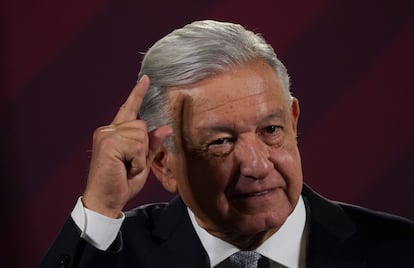Mexican president proposes fentanyl ban and calls US anti-drug policies a failure
President Andrés Manuel López Obrador has struggled in recent days with the issue of fentanyl, which has become a major security concern for the US government

Mexico’s president called anti-drug policies in the US a failure Wednesday and proposed a ban on using fentanyl in medicine, even though little of the drug crosses from hospitals into the illegal market.
President Andrés Manuel López Obrador has grappled in recent days with the issue of fentanyl, which has become a major security concern. López Obrador has denied that Mexico produces fentanyl, which causes about 70,000 US overdose deaths per year.
US authorities estimate that most illegal fentanyl is produced in clandestine Mexican labs using Chinese precursor chemicals. Relatively little of the illegal market comes from diverting medicinal fentanyl used as anesthesia in surgeries and other procedures.
But López Obrador said he would ask doctors and experts whether all use of fentanyl by doctors could be ended, as well, to reduce illicit use.
“We are also going to ask that medical use be ended in the United States, as well,” López Obrador said.
There have been only scattered and isolated reports of glass flasks of medicinal fentanyl making it to the illegal market. Most illegal fentanyl is pressed by Mexican cartels into counterfeit pills made to look like other medications like Xanax, oxycodone or Percocet.
Many people who take those pills do not know they are taking fentanyl.
On Tuesday, Mexico’s Defense Department said soldiers found over 1.83 million such counterfeit fentanyl pills at a stash house in the border city of Tijuana.
The flood of illegal fentanyl has sparked calls in the United States to designate Mexican drug gangs as terrorist organizations, with some calls amid Republicans to use the U.S. military to crack down on the Mexican cartels.
López Obrador has rejected calls to crack down on the cartels.
“We are not going to be their servants,” he said of the United States. “We were elected by the people of Mexico to protect Mexicans.”
“We have to help one another, but not submit to anything, much less failed strategies,” he said, adding the US Drug Enforcement Administration “has proved it can’t handle” the problem.
Later Wednesday, Mexico’s top diplomat claimed his country had seized the equivalent of about 6 billion fentanyl pills. That is almost certainly an exaggeration, given that much of the 6.5 tons of fentanyl the government has seized since late 2018 had already apparently been cut or diluted when it was found.
Foreign Relations Secretary Marcelo Ebrard said those in the United States calling for tougher measures were “ungrateful, to say the least” for Mexico’s efforts.
Ebrard said Mexico would embark on a public education campaign in the United States to highlight Mexico’s interdiction efforts. López Obrador said Mexico and the United States would also start a public outreach effort to educate people about the dangers of fentanyl.
The Mexican president has blamed a lack of American family values for increasing fentanyl use. López Obrador has given no sign he understands that, because Mexican cartels disguise fentanyl as prescription medications, many Americans who take the pills do not know they are taking fentanyl.
Sign up for our weekly newsletter to get more English-language news coverage from EL PAÍS USA Edition
Tu suscripción se está usando en otro dispositivo
¿Quieres añadir otro usuario a tu suscripción?
Si continúas leyendo en este dispositivo, no se podrá leer en el otro.
FlechaTu suscripción se está usando en otro dispositivo y solo puedes acceder a EL PAÍS desde un dispositivo a la vez.
Si quieres compartir tu cuenta, cambia tu suscripción a la modalidad Premium, así podrás añadir otro usuario. Cada uno accederá con su propia cuenta de email, lo que os permitirá personalizar vuestra experiencia en EL PAÍS.
¿Tienes una suscripción de empresa? Accede aquí para contratar más cuentas.
En el caso de no saber quién está usando tu cuenta, te recomendamos cambiar tu contraseña aquí.
Si decides continuar compartiendo tu cuenta, este mensaje se mostrará en tu dispositivo y en el de la otra persona que está usando tu cuenta de forma indefinida, afectando a tu experiencia de lectura. Puedes consultar aquí los términos y condiciones de la suscripción digital.








































